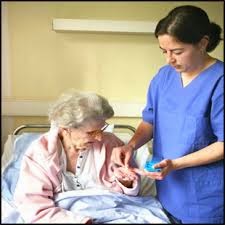By
Lanee’ Blunt
As
a certified nurse assistant you will have some flexibility when it comes to
choosing what type of employment you want to go into. Once you have experience
working you can go into areas of employment, such as nursing homes, hospitals,
assistant living and home health aide agencies. The position is about providing
quality care to the elderly, chronically ill, and disabled, in which you will
implement specific nursing procedures and help them with their daily care.
Physical Demands of a Certified Nurse Assistant
The
work requires a lot of exercise because you will be on your feet most of the
day. You will stand, walk, bend, kneel,
stoop, crouch, crawl and climb all day. There is some lifting and most jobs
require that you meet a lift requirement of over 50 pounds. There are vision
requirements of close, distance, color, peripheral, and depth perception and
the ability to adjust focus.
Direct Patient Care Duties
- The job duties include helping patients with daily living care.
- They help residents in and out of wheelchairs and transfer them in and out of bed.
- They bathe and help them to get dressed brush their hair, and assist them using the toilet.
- Nurse aides are the principle care givers in nursing homes. They have a lot of contact with the patients and often develop close caring relationships with them. The job also involves assisting nurses by measuring patient's vital signs, blood pressure and temperature.
- They serve meals, set up their food tray and assist patients by feeding the ones that can't feed themselves.
- They assist patients in walking, and transferring them between beds and wheelchairs.
- They monitor the health of patients and make notes of changes in health and inform and report them to a supervising nurse.
Other Duties
- Provides individual care, it promotes the patient’s ability to keep or reach the highest physical, and mental health.
- Preserves comfort, privacy, and dignity of patients in the distribution of services to them, communicates with residents in a manner that displays warmth.
- They must understand that residents have rights.
- Assists nurses by keeping them informed about patient’s environment by telling the charge nurse of any changes or deficiencies such as lighting or equipment problems.
- Help to protect the patient’s personal belongings such as eyeglasses, dentures, hearing aids, jewelry, clothing and memorabilia. They must reports missing items according to the company policy and participate in helping locate lost items.
- Answers residents’ call bells promptly and courteously.
- Provides care for patients skin to prevent pressure ulcers, and skin tears.
These
duties may be included for nursing assistants that are working in a home
environment such as, assisting clients with and preparing shopping list,
performing grocery shopping and preparing meals. They transport patients to
vocational, recreational, medical, and religious and community activities and
experiences and run miscellaneous errands.
Job Outlook and Security
The
occupational outlook for this job is excellent. The elderly population has
increased and there are many nursing aides that will be needed to fill various
positions. The position is expected to grow by 20 percent from 2010 to 2020, explains
the U.S. Bureau of Labor Statistics. Your job prospects should be good as long
as you have training and a certificate and many new to the field begin working
in a nursing home. The job security is full time employment, medical, and all
shifts.
Training Requirements
A
nursing aide must earn a certificate. The training is very fast and if you
apply yourself you can finish your training in as little as 6-to-12 weeks. The
programs may be found in community colleges, vocational and technical schools, online,
nursing homes and hospitals. Your training course must meet both Federal and
State training requirements. Students learn the following: Safe patient care,
taking and recording the patients’ blood pressure, temperature, pulse rate and
respirations, first aid for choking, and assisting in daily living including
hygiene, applying safe and correct techniques with moving patients and filling
out medical forms and bedside charts.
Advantages & Disadvantages
You
will have full time employment. Many registered nurses started out as nurse
aides before they went on to become nurses. They said that it gave them a lot
of experience so that they could get a feel for the nursing profession and work
while they were going to school. It is a rewarding career if you are a
compassionate person.
The
Disadvantages of being a certified nurse assistant is that you may have a heavy
patient load and many to take care of. Some of your patients may be depressed
about their condition and mean. You may work long hours and some holidays.
Reference:
PayScale:
Certified Nurse Assistant
Bureau
of Labor Statistics: Nursing Aides, Orderlies, and Attendants
Careerbuilder:
Certified nursing assistant












